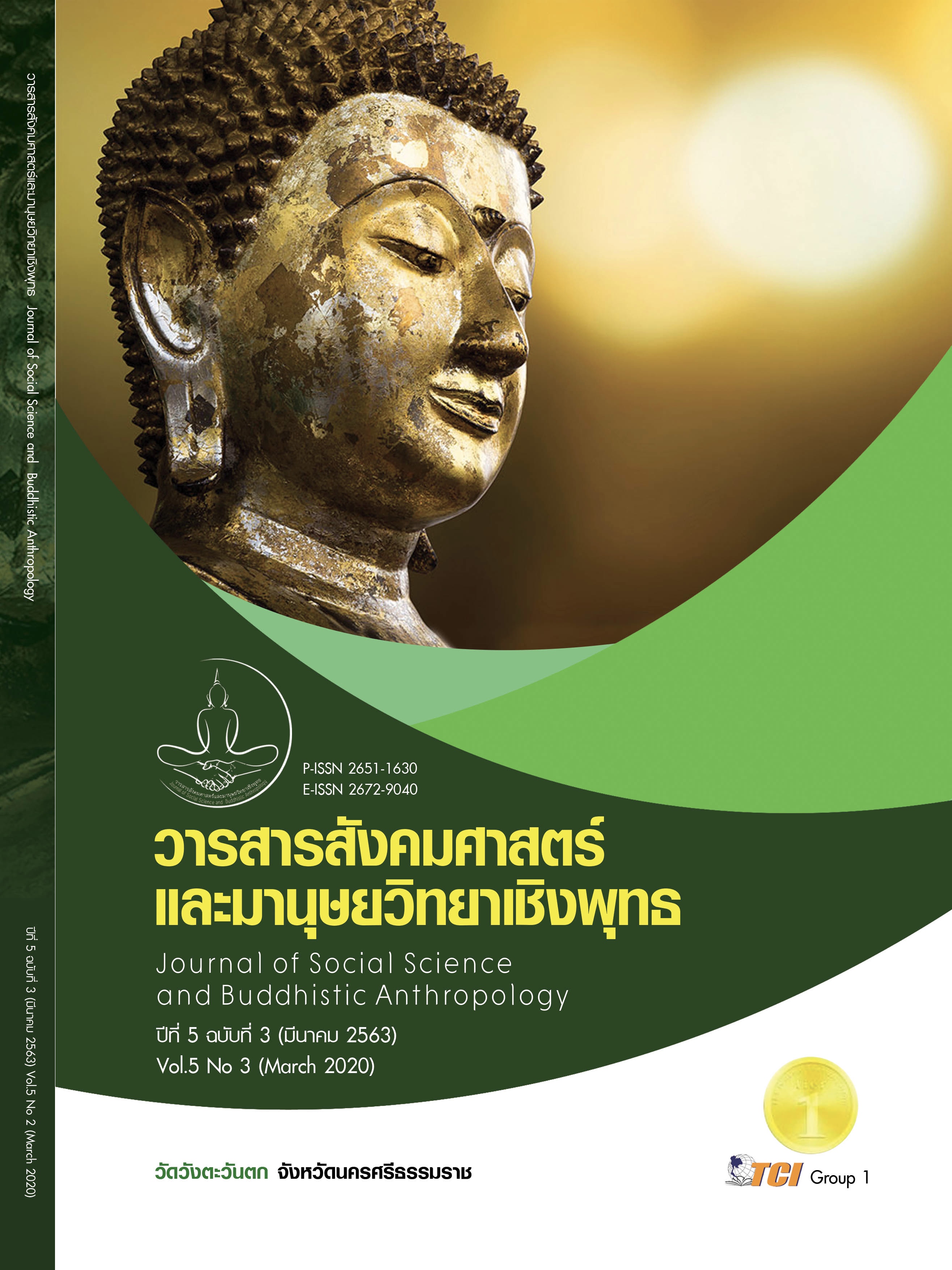EFFECT OF IMPLEMENTING BUDDHIST CRITICAL REFLECTION PROGRAMON EMOTIONAL QUOTIENT AND POSITIVE CONATION OF SECONDARY 2 STUDENTS
Keywords:
Emotional Quotient, Positive Conation, Critical Reflection, Secondary 2 students, Cognitive ProcessAbstract
This research article Has 3 objectives 1) to study emotional quotient and positive conation improvement by using Buddhist Critical Reflection Program 2) to implement the proper Buddhist Critical Reflection Program (BCRP) on emotional quotient and positive conation of Secondary 2 students 3) to study the effect of implementing Buddhist Critical Reflection Program (BCRP) on emotional quotient and positive conation of Secondary 2 students. The sample group was the 64 grade Secondary 2 students, 13-14 years old. The selective method was by using Purposive Sampling to divide subject into 2 groups, 1) experimented group and 2) controlled group. The tools used in this research consist of :- 1) the questionnaire to measure the rational emotional quotient (EQ) 2) the questionnaire to measure the rational positive conation (CON) and 3) the Buddhist Critical Reflection Program (BCRP) on emotional quotient and positive conation (13 times 20 weeks). The with-in group hypothesis testing were conducted by One-way ANOVA (Repeated Measure) and the between group and time (Pretest – Posttest - Follow Up) hypothesis testing were conducted by using Two-way ANOVA. The results of research can be concluded that Buddhist Critical Reflection Program (BCRP) has improved emotional quotient and positive conation on Secondary 2 students; however, they would be declined if the students had not practiced continuously. Therefore, this BCRP program should be implemented for practicing in other organization for improving emotional quotient and positive conation widely and effectively.
References
เกรียงศักดิ์ เจริญวงศ์ศักดิ์. (2549). การคิดเชิงสร้างสรรค์. กรุงเทพมหานคร: บริษัทซัคเซส มีเดีย.
พระพรหมคุณาภรณ์ (ป. อ. ปยุตฺโต). (2559). พุทธธรรม ฉบับปรับขยาย. กรุงเทพมหานคร: สำนักพิมพ์ผลิธัมม์.
พระมหาสมเกียรติ รตนปัญโญ. (2553). ผลของการฝึกสำรวมสติและการฝึกคิดแบบโยนิโสมนสิการต่อปรีชาเชิงอารมณ์แนวพุทธศาสนา ของนักเรียนระดับมัธยมศึกษาปีที่ 4 โรงเรียนศรีอยุธยาในพระอุปถัมภ์ฯ. ใน ปริญญาวิทยาศาสตรมหาบัณฑิต สาขาวิชาการวิจัยพฤติกรรมศาสตร์ประยุกต์. มหาวิทยาลัยศรีนครินทรวิโรฒ.
มหาวิทยาลัยมหาจุฬาลงกรณราชวิทยาลัย. (2539). พระไตรปิฎกภาษาไทย ฉบับมหาจุฬาลงกรณราชวิทยาลัย. กรุงเทพมหานคร: โรงพิมพ์มหาจุฬาลงกรณราชวิทยาลัย.
วรากรณ์ พูลสวัสดิ์. (2559). จริยธรรม และทักษะชีวิต. กรุงเทพมหานคร: โอ. เอส. พริ้นติ้ง เฮ้าส์.
วิญญู เถาถาวงษ์. (2558). การจัดการเรียนรู้แบบโยนิโสมนสิการ. “ศึกษาศาสตร์ มมร”, 3(2), 1-12.
สถาบันราชานุกูล. (2555). กรมสุขภาพจิตเผยวิจัยพบเด็กไทยอีคิวต่ำกว่ามาตรฐาน. เรียกใช้เมื่อ 17 มิถุนายน 2555 จาก:http//www.rajanukul.go.th/new/index.php?mode=maincontent&group=225&id=151&date_start=date_end= [26
สะอาด ภิญโญศรี. (2552). การพัฒนาความสามารถด้านการคิดอย่างมีวิจารณญาณของนักเรียนมัธยมศึกษาปีที่ 2 กลุ่มสาระการเรียนรู้ภาษาไทยโดยใช้รูปแบบการสอนแบบโยนิโสมนสิการ. ใน วิทยานิพนธ์การศึกษามหาบัณฑิต สาขาหลักสูตรและการสอน. มหาวิทยาลัยมหาสารคาม.
เอกชัย จุละจาริตต์. (2548). แนวภูมิปัญญาไทย. กรุงเทพมหานคร: สำนักพิมพ์สามลดา.
Clark, D. M. & Fairburn, C. G. (1997). Science and Practice of Cognitive Behaviour Therapy. Oxford: Oxford University Press.
Erickson, E. H. (1968). Identity: Youth, and Crisis. New York: Norton.
Gray P. (1994). Psychology. New York: Worth Publishers.
Loftus, G. R. (1976). Human Memory: The Processing of Information. New Jersey: Lawrence Erlbaum Associates.
Piaget, J., & Inhelder. (2000). The Psychology of The Child. (2nd ed.). New York: Basic Books, Inc.
Salovey, P. & Mayer, J. D. (1990). Emotional Intelligence. Imagination, Cognition, and Personality. New York: Baywood Publishing Co., Inc.
Seligmen, M. E. P., & Csikszentmihalyi, M. (2000). Positive psychology: An introductio. American Psychologist, 55(1), 5-14.
The Health Promotion Fund (NESDB). (2018). The mental health of people 4 ages. เรียกใช้เมื่อ 11 November 2018 จาก https://www.thaihealth.or.th/Content/27602
Wilding, C. (2015). Cognitive Behavioural Therapy. London: Hodder and Stoushton.
Woolfolk, A. (2004). Educational Psychology. Boston: Allyn & Bacon.









